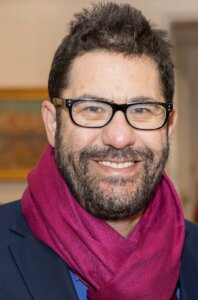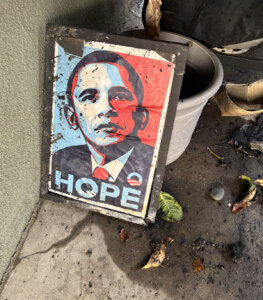‘Like the burning bush’: Rabbi’s book survives Holocaust – and the Los Angeles fire
‘Sacred Fire’ by the Warsaw Ghetto rabbi was almost all that was left of LA rabbi’s home

The Pasadena home of Rabbi Joshua Levine Grater was burned in a wildfire, but one book survived. Courtesy of Joshua Levine Grater
Rabbi Joshua Levine Grater stood in what used to be his family room, a place that once pulsed with life — holiday gatherings, sports on the big screen, the chatter of loved ones. Now it was reduced to ash, swallowed by the relentless wildfire that had torn through Pasadena, leaving nearly 40,000 acres scarred and roughly 10,000 homes destroyed. His house of 22 years was one of them.
As he stepped gingerly through the rubble, searching for something, anything, he spotted a book sitting atop a pile of ash. It was pristine, untouched by the flames. The title caught his breath: Sacred Fire. On its cover, a bright orange flame burned, eerily mirroring the inferno that had consumed so much. “It was in perfect condition,” Levine Grater said when we spoke Sunday, his voice still tinged with disbelief.
The book is a collection of essays on the Torah and Jewish holidays by Rabbi Kalonymus Kalman Shapira, the Grand Rebbe of Piaseczno in Poland. Shapira’s story is one of survival in the face of annihilation. The Nazis murdered Shapira’s children and forced the rabbi into the Warsaw Ghetto, where he ran a secret synagogue and delivered weekly sermons. He compiled the pages of those lectures, hiding them in a milk canister to be unearthed after the war. Decades later, in a house reduced to cinders, his words were discovered again.
“It’s like the burning bush in the Torah,” Levine Grater said. “The bush was on fire, but it was not consumed.”
The family room had shelves containing hundreds of books, but this was the only one that survived the inferno. As he flipped through its pages, the smell of smoke still clinging to them, he landed on Shapira’s teaching for Parshat Vayechi, the Torah portion read this past week at synagogues around the world.
Shapira wrote of Jacob’s final moments, when the patriarch wanted to reveal the “end of days” to his children but was stopped by God. For Levine Grater, it was a lesson in accepting the limits of human understanding.
“This is not the end,” Levine Grater said. “When you see the teaching of Rabbi Shapira that he’s giving in 1939 on the eve of the Holocaust, that we can’t always see the end, but God is with us even in this fire. It’s these polar opposites of destruction and rebuilding.”
‘I am houseless, but I am not homeless’

Levine Grater, 54, describes himself as a Grateful Dead fan, a motorcycle rider and a “flawed human.” He served for 12 years as rabbi of the Pasadena Jewish Temple and Center, a century-old synagogue that also burned to the ground on Tuesday night.
Since 2017, he has been the executive director of Friends In Deed, a nonprofit helping Pasadena’s homeless for 130 years. At least two of his colleagues at the organization also lost their homes to the fire. And while his own family has temporary shelter and financial resources, the fire has deepened an already dire housing crisis in the city. Friends In Deed had recently placed some of their homeless clients into a permanent supportive housing building, but it, too, burned down.

And yet, amid the ash and heartbreak, he searches for the light. “I am houseless, but I am not homeless,” he said. “I have a lot of support. I have financial resources. I have good insurance. I have family and friends stepping up to help.”
For now, Levine Grater, his wife Franci, and their dog Toby are staying in an Airbnb. Their twin adult children, Noah and Ella, are nearby, pitching in where they can. “In the grand scheme of things,” he said, “I feel lucky.”
Two items survived the fire in Levine Grater’s home. One was Sacred Fire. The other was a framed copy of the Obama “Hope” poster. The juxtaposition wasn’t lost on him. A book that had survived the Holocaust, now unearthed again in a moment of devastation. A poster that embodied optimism in the face of uncertainty. Together, they seemed to whisper a lesson that only a rabbi could articulate.
“There’s fire and fury and destruction and fear,” he said. “And then you have this reminder: Nothing can extinguish hope.”
A message from our Publisher & CEO Rachel Fishman Feddersen

I hope you appreciated this article. Before you go, I’d like to ask you to please support the Forward’s award-winning, nonprofit journalism so that we can be prepared for whatever news 2025 brings.
At a time when other newsrooms are closing or cutting back, the Forward has removed its paywall and invested additional resources to report on the ground from Israel and around the U.S. on the impact of the war, rising antisemitism and polarized discourse.
Readers like you make it all possible. Support our work by becoming a Forward Member and connect with our journalism and your community.
— Rachel Fishman Feddersen, Publisher and CEO





























